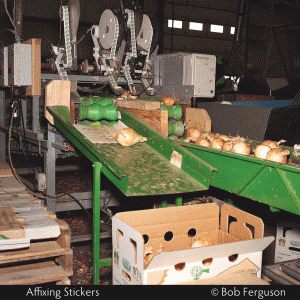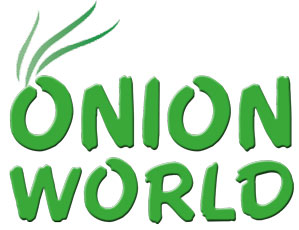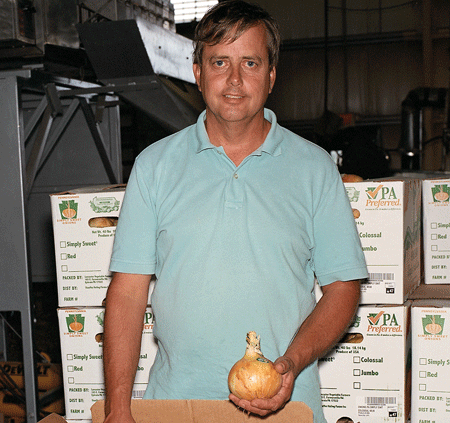By Dorothy Noble
Delightfully sweet, sizable, light-colored and globe-shaped, Pennsylvania’s Simply Sweet Onions command a spot as a specialty fresh market onion.
Although seasons vary somewhat, Bill Saussaman, broker with Stauffer Huling Farms, reports, “This year’s crop is yielding 30 percent more jumbo and over-sizes.”
The average of this year’s sugar content has not yet been measured, but according to its trend, it should be impressive. Saussaman notes that last year’s tests showed many onions with 10.8 and 11 percent soluble solids, with an average of 7.9 percent.
Quality Control
For the Simply Sweet Onions label, the onions must be grown in the Commonwealth of Pennsylvania by licensed growers. Handlers who grade, package or sell the onions must also be licensed. The Pennsylvania Vegetable Growers Association holds the trademark.
Only onion varieties approved by the Onion Committee can be in the program. Further, the sugar content must be at least 6 percent soluble solids.
Each grower or handler must have samples tested from each field for sugar content and pungency analysis. If more than one variety is grown, each must be tested. The sampling procedure and laboratory must be approved by the Committee. Onions from fields that do not meet the sugar level standard cannot be marketed under the brand. If a sample fails the sugar test, one more sample may be tested. Although the Committee requires the pyretic acid evaluation, it has not set standards for its level.
The minimum size to be sold under the Simply Sweet Onions name is 2.5 inches in diameter. Onions of 2.5 inches to 3 inches are graded medium. Jumbo onions measure 3.1 to 4 inches; colossal 4.1 to 5 inches; and 5.1 inches and above are designated super colossal.
Growing Requirements
A soil test for sulfur is recommended, particularly for new growers.
Transplants are planted from about March 15 through the first week of May depending on the region grown and conditions. About 50,000 plants per acre are grown, many on raised beds. The onions must be grown with drip irrigation. Plastic mulch is suggested, but if grown without plastic mulch, an adequate pre-emergent herbicide program must be implemented for weed control.
Extensive Penn State research provides disease and insect controls and techniques, plus harvest, curing and storage guidance.

Lancaster Vegetable Farms Co-Op Procedures
Although some farms in both central and western Pennsylvania are licensed, members of the Lancaster Vegetable Farms Co-Op produce about 90 percent of the Simply Sweet Onions crop. This group of about 100 primarily Plain Sect farmers grows a diversified assortment of vegetables, fruits and flowers. Each farm produces the onions on one to three acres.
After the typical late June through mid-July harvest in this Lancaster southeastern Pennsylvania region, the onions are transported to the Co-Op’s packing house. Wooden bins hold the onions where the forced air system dries and cures the onions in four to seven days. The organically-grown onions are strictly separated throughout the entire process.
Only one farm’s onions are graded and packed at a time. The assembly line typically consists of many ages and sexes of the farm family working together. After the brusher machine eliminates the debris of loose skin and dirt, the trained eyes of the family members inspect for firmness and moisture especially in the necks, and for any imperfections. As the sizer sorts and PLU stickers are placed on the large onions, a pair of the farm boys boxes the jumbo, colossal and super colossal onions, and bag the 2.5- and 3-inch onions.
The onions are then stacked into the cooler. The mid-50 degrees Fahrenheit temperature prevents black mold and ensures the onions retain their prime condition prior to shipping. Stauffer and Huling Farms, Inc. handles the sales and the distribution which reaches chain and independent retailers and wholesalers throughout Pennsylvania and nearby states. No onions are marketed through produce auctions.
Each of the boxes and bags carries the farm number and dates plus the broker identification data for traceability purposes.
The Co-Op uses a Group GAP program with recognized food safety programs verified by USDA-licensed auditors. Because USDA developed Group GAP for small farmers to pool resources in order to share certification costs, the Co-Op clearly fits USDA’s intent.
Jeff Stoltzfus, currently food safety educator at Lancaster County Extension, worked with the Co-Op’s farmers for over 15 years while he was an instructor with the Eastern Lancaster School District. That school district was part of a USDA Group Gap pilot project; Stoltzfus, plus the Co-Op members participated in the project.
Program Success
From its meager beginning, Simply Sweet Onions has shown steady growth.
Twelve years ago broker Mike Kotz, Penn State vegetable crops professor Mike Orzolek, Pennsylvania Vegetable Growers Association executive director Bill Troxell, and three pioneer vegetable growers in western Pennsylvania envisioned marketing a branded vegetable. At that time, locally grown sweet onions were not readily available in July, August and September. So they formed an Onion Committee and the Simply Sweet Onions program was born.
Orzolek presented the attributes of Simply Sweet Onions at one of the vegetable meetings in New Holland organized by Stoltzfus. Those Lancaster area farmers realized the possibilities and formed the Co-Op within a few years.
Since then, Orzolek has evaluated over 120 varieties of sweet Spanish onions and other colors and sizes, conducted field trials and developed production recommendations.
Along with its economic return, Orzolek says, “The other benefit of the Simply Sweet Onions program for Pennsylvania growers is that it opened the door for growers and promotion programs to grow and market their vegetables in a different season and new markets. I am proud to have been part of a very successful program that will only continue to grow in the future.”
Update on Allium Leafminer
As noted, the bulk of Simply Sweet Onions are grown in the Lancaster County area. This is where the allium leafminer was first confirmed in December 2015. The earlier crop of spring onions in the same area suffered this season. However, due to the life cycle of the adult flies, damage to the sweet onions was minimal.
“We dodged the bullet,” Saussaman and Stoltzfus both report. The scant damage to the Simply Sweet Onions crop appeared on the larger, more mature transplants.
The Pennsylvania Department of Agriculture’s webpage now includes a map which shows pending verification and positive identification areas. An updated pest alert from APHIS is forthcoming and will be available at www.aphis.usda.gov.
Originally published in Onion World


